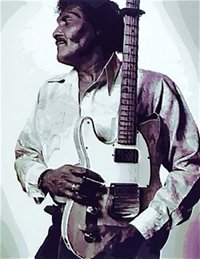|
Albert Collins, Guitarist, Dies; Influential Blues Stylist Was 61 |
nytimes.com
 Albert Collins, a Grammy-award winning blues guitarist, died Wednesday after a three-month fight against cancer. Mr. Collins died at his Las Vegas home, according to a statement from Alligator Records, a label he had recorded for. He was 61. Albert Collins, a Grammy-award winning blues guitarist, died Wednesday after a three-month fight against cancer. Mr. Collins died at his Las Vegas home, according to a statement from Alligator Records, a label he had recorded for. He was 61.
Mr. Collins made his reputation by combining savage, unpredictable improvisations with an immediately indentifiable tone, cold and pure. His shows were often wild rides, intense performances that burst with his almost endless imagination. He was a master of the ecstatic moment, and made use of his imagination, the volume of his playing, and his chilly sound.
Mr. Collins was a funny man, whose best improvisations often came in the middle of novelty songs. And when he performed, he'd use a long cord which allowed him to wander into the audience. He was an entertainer first, more interested in making a party go than in bringing tears to the eyes of his audience. His presentation made a difference: by the late 1960s, he began to appeal to a wider rock audience, one that he maintained to his death.
Mr. Collins, who was known as "the Master of the Telecaster" for the Fender Telecaster guitar he used, was born Oct. 1, 1932 in Leona, Texas. He was the finest example of the Texas blues tradition, which included other guitarists like Lightnin' Hopkins, T-Bone Walker, Clarence (Gatemouth) Brown, Freddie King, Johnny (Guitar) Watson and Johnny Copeland. Like some of them, Mr. Collins used the fingers of his right hand to strike and pluck the strings instead of a plectrum. That contributed to the percussive aspect of his sound.
And like Mr. Brown, Walker and Watson, Mr. Collins's music moved between the horn-driven sound of a jazz big band, blues and rhythm and blues. Though Mr. Brown was one of his first influences, Mr. Collins had at one time considered a career as a jazz guitarist, and his early listening included Jimmy Lunceford, Louis Jordan and others. And his distinct sound was partly due to an unusual minor tuning he used.
Mr. Collins began performing in Houston nightclubs and soon recorded his first rhythm-and-blues instrumental hit, "The Freeze" (1958).
"His solos are brusque and saw-toothed - fast, jagged phrases, single notes that bend and shriek," wrote Jon Pareles of The New York Times in 1985.
Mr. Collins's first important album, "Truckin' With Albert Collins," was recorded in 1965 for a rock label, Blue Thumb, and it includes a series of now-legendary tracks including remakes of singles like "Frosty" and "Snow Cone." It wasn't until 1968, when Mr. Collins's career took off after recording a series of albums on the Imperial label that finally captured his sound and improvisational fury.
In 1977 Mr. Collins signed with the Alligator label and recorded a series of albums that were universally acclaimed and which received several Grammy nomainations. "Don't Lose Your Cool" (1983) won the W. C. Handy Award for best blues album of the year, the equivalent of the Grammy from the blues community.
"Showdown," a 1985 recording with Mr. Collins, Mr. Cray and Johnny Copeland - a session that amounted to an all-star guitarists' convocation - earned a Grammy Award.
Among his biggest hits through a Grammy nomination came in 1986 with "Cold Snap." Mr. Collins toured Europe, Australia and Japan, as well as the United States. He appeared before more than 1.8 billion people at the televised Live Aid concert in Philadelphia in 1985.
Mr. Collins was a frequent fixture at clubs in New York City. He starred at the American Guitar Heroes concert at Carnegie Hall in December 1985. He performed at other New York venues, including the Bottom Line, the Beacon Theater and aboard a Musicruise Dayliner sailing around Manhattan on the opening night of the 1987 JVC Jazz Festival.
Mr. Collins was credited by the equally celebrated guitarist Jimi Hendrix, in an interview in the 60's, with being one of his primary influences.
"There's one cat I'm still trying to get across to people," Hendrix said. "His name is Albert Collins. . . . He's good. Really good."
Mr. Collins is survived by his wife, Gwendolyn, and his father, Andy Thomas.
By PETER WATROUS
Published: November 25, 1993
|

